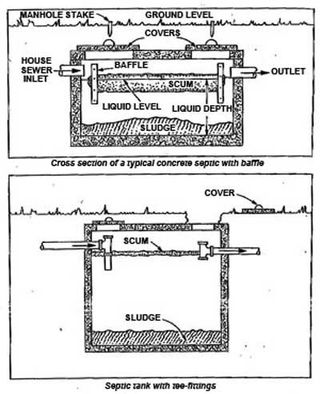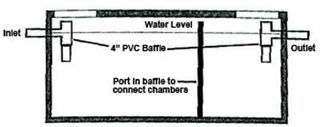Know About Septic Systems & How They Work
At LJH Services, we provide our customers with knowledge about septic systems. Our goal is to educated and let you know how your septic tanks work. For more information call 956-381-5223
today.
What Are Septic Tanks?
Your septic tank is a key component of your water treatment and recycling system. It serves as a settling basin where solids accumulate and gradually get broken down by bacterial action.
Some of the organic waste is actually liquefied by this "natural bacterial decomposition," however the rest of the waste accumulates in the bottom as a layer of sludge.
How Do Septic Tanks Work?
The population living in metropolitan areas simply flush their toilets and "away go troubles down the drain." Those of us living in more rural areas have been forced to learn about the maintenance and working of the sewerage treatment facility attached to our home, "the septic system." Usually a septic tank is connected to a drainage field or seepage pit of some kind. If properly maintained, a well-designed system will last almost indefinitely. However, if it is neglected for too long a time, it can back up and clog the drainage field. This neglect can result in an expensive excavation and even a replacement of the drainpipes that could cost thousands of dollars.
Design of The Tank
Although designs vary, most septic tanks consist of a watertight, below ground tank that has one or two manhole covers (buried a few inches below ground) to provide access for pumping, cleaning and inspection. Effluent from the house flows into the tank through an inlet pipe near the top on one side. It flows out through a discharge or overflow pipe at the other side. The pipe may end in a large tee-fitting or into a baffle (wall) preventing the effluent from flowing straight across from one pipe to the other.
The incoming effluent will be diverted downward with a minimum of splashing, allowing the solids to sink to the bottom.
Outgoing effluent is drawn from several feet below the top layer of the floating waste (grease, oil, scum) so that only liquid waste or solids that have been liquefied by the BACTERIAL ACTION going on at the bottom of the septic tank (which we will come back to this point later) are discharged out into the drainage field. In the drainage field, further decomposition of the soluble organics will occur releasing the basic building blocks back to the environment

Components of Sewage Treatment Systems
The typical household sewage treatment system consists of a house sewer, septic tank, distribution box and absorption field or seepage pit.
House Sewer - The pipeline connecting the house and drain and the septic tank.

Septic Tank -
Untreated liquid household wastes (sewage) will quickly clog your absorption field if not properly treated. The septic tank provides this needed treatment.
Distribution Box -
Serves to distribute the flow from the septic tank evenly to the absorption field or seepage pits.
Absorption Field -
A system of narrow trenches partially filled with a bed of washed gravel or crushed stone into which perforated or open joint pipe is placed.
Cesspools
- Work in a similar manner to septic systems. Sewage water usually seeps through the open bottom and portholes in the sides of the walls. These can also clog up with overuse and the introduction of detergents and other material which slow up the bacterial action.
Maintenance
Since solids will continue to build up at the bottom of the tank, it is imperative that the "septic tank be pumped out periodically." Remember, the inorganic fraction of the sludge is not biodegradable, if it's not pumped out, sludge will accumulate until it overflows where it can cause problems in the absorption field.
Treatment
It is important to get the septic tank cleaned before the sludge level gets high enough so that any of the solid material at the bottom, or the semi-solid scum at the top can flow out into the drainage field. This will quickly clog the drainage pipes and the soil into which they drain. If this happens the only cure would be to dig up and replace the entire drainage field.
Local & State Regulations
As communities grow more crowded and awareness of the impact of one home upon another, regulatory authorities have begun to pay more attention to proper maintenance of each individual property.
One factor under scrutiny is the septic system. Rather than leave it up to the home owner to decide how often to clean and pump a system, a growing number of municipalities are imposing requirements. In addition, state laws are becoming more stringent. If an existing system fails, or in the building of new homes, some states have begun imposing tighter regulations on the types of systems allowed.
Nationwide about 25% of all homes rely on a septic system. With so many systems in constant use and most of them older models of inferior design, fear has been mounting that improperly maintained systems will pollute ground-water supplies or that the health of ones own family could be jeopardized.
On the local level, some individual communities are starting to enact regulations. Brookfield, CT for example, passed an ordinance in 1985 requiring the inspection of every home with a septic system, once every four years.
On the state level, Connecticut passed legislation in 1989 requiring the replacement of any failed tank with a more sophisticated, more expensive two-compartment tank.
THE BEST WAY TO AVOID major repairs or replacement, or to avoid being fined for operating a substandard system is to call in your local SEPTIC PROFESSIONAL.
- He can coach you on all local laws and regulations.
- He can check out your system.
- He can coach you on the proper maintenance of your system.
- He can save you money by pumping out your system before it fails.
PLEASE NOTE...
Your septic system does have potential health concerns for you and your family. Accidents due to noxious gases have occurred.
Other than the routine maintenance that is described to you by your septic professional, all your additional septic system needs should be discussed with him before you attempt to perform them yourself.
